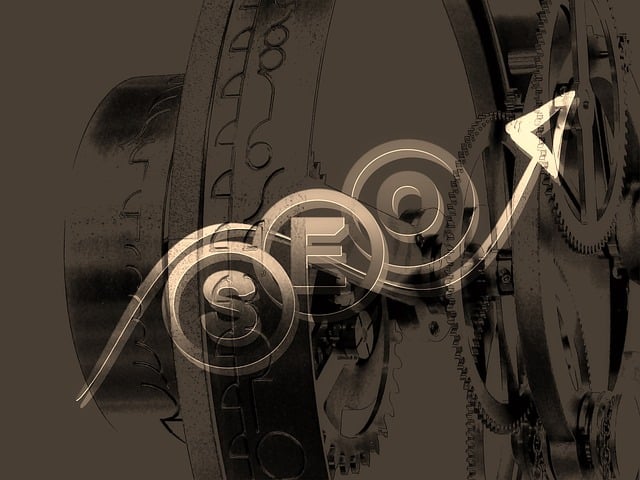Off-Page SEO strengthens a website's trust and authority, indirectly impacting search rankings. It includes social media engagement, influencer partnerships, guest blogging, and reputation management to establish brand expertise and credibility. High-quality backlinks from authoritative sites are crucial, gained through strategic initiatives like guest blogging and collaborations. Leverage social signals on platforms to build trust and engage audiences, using positive interactions as whispers of endorsement. Local citations, monitored via tools, enhance visibility within specific areas. Competitor analysis reveals industry trends and tactics, while ethical practices avoid Black Hat SEO methods. Success is measured through backlink quality, referral traffic analysis, and refined content distribution strategies.
Building trust and authority is paramount for effective search engine optimization (SEO). This comprehensive guide delves into the crucial aspects of Off-Page SEO, laying the foundation for a robust online presence. We explore strategies that foster credibility, from cultivating high-quality backlinks to leveraging social signals and local citations. Learn how brand mentions and customer reviews contribute to your authority, and discover ethical practices to avoid black hat techniques. By understanding these elements, you’ll enhance your website’s visibility and establish trust with your audience.
Understanding Off-Page SEO: The Foundation of Trust and Authority

Off-Page SEO forms the bedrock upon which your website’s trust and authority are built, operating outside your direct control but significantly influencing your search rankings. It encompasses a wide range of strategies aimed at establishing your site as a credible and reliable source of information in the eyes of both search engines and potential visitors. This involves acquiring high-quality backlinks from reputable websites, demonstrating your brand’s expertise through influential mentions, and fostering positive online interactions that signal to search algorithms your site’s value and trustworthiness.
Key components of Off-Page SEO include social media engagement, influencer collaborations, guest blogging, and online reputation management. Each tactic contributes to building a robust online presence, driving relevant traffic, and encouraging user signals such as lower bounce rates and longer session durations. These user-generated metrics are crucial for search engines in determining your site’s quality and authority, thereby enhancing its visibility and organic reach over time.
The Role of High-Quality Backlinks in Building Credibility

High-quality backlinks are a cornerstone of Off-Page SEO and play a pivotal role in establishing your website’s credibility and authority. When reputable and relevant websites link to yours, it acts as a vote of confidence from industry peers. Search engines interpret these links as endorsements, signifying that your content is valuable and trustworthy. The quality and quantity of backlinks can significantly impact your search rankings, with high-authority sites passing on their reputation and trustworthiness to the linked webpages.
Acquiring these backlinks involves strategic efforts such as guest blogging, influencer collaborations, and creating shareable, link-worthy content. It’s essential to focus on gaining links from websites that align with your niche or industry, ensuring the backlinks are natural and contextually relevant. This approach not only boosts your SEO but also fosters a sense of credibility among your target audience, encouraging them to engage and trust your online presence.
Strategies for Earning Quality Backlinks

Building high-quality backlinks is a cornerstone of successful Off-Page SEO. These links act as votes of confidence from one website to another, signaling to search engines that your content is valuable and trustworthy. To earn quality backlinks, focus on creating exceptional content that naturally attracts links. This could involve in-depth research, unique insights, or engaging media formats. Engaging with industry influencers and other reputable websites through guest blogging, collaborations, or thoughtful comments can also open doors for link opportunities.
Additionally, building relationships with journalists and bloggers in your niche can lead to organic mentions and backlinks. Always ensure that any links acquired are relevant to your site’s content and focus on sites with solid authority themselves. This strategic approach not only bolsters your Off-Page SEO but also establishes your website as a trusted resource within your industry.
Leveraging Social Signals to Enhance Online Reputation

In the realm of Off-Page SEO, leveraging social signals is a powerful strategy to enhance online reputation and build trust among potential customers. Social media platforms serve as a digital tapestries where brands can weave their narratives, engage with audiences, and gather valuable feedback. By consistently sharing high-quality content, interacting with followers, and encouraging user-generated content, businesses can establish themselves as authority figures in their respective industries.
Positive social signals, such as shares, likes, comments, and reviews, act as whispers of endorsement that resonate far beyond the digital sphere. These interactions not only signal to search engines that a brand is trustworthy but also foster a sense of community and engagement. By actively participating in relevant online conversations and groups, businesses can navigate the labyrinthine digital landscape, leaving behind indelible marks of credibility and authority.
Utilizing Brand Mentions and Customer Reviews

Building trust and authority is a key aspect of effective search engine optimization (SEO), especially within the context of Off-Page SEO strategies. One powerful tool in this regard is leveraging brand mentions and customer reviews. When other websites or influencers reference your brand positively, it acts as a social proof that enhances your credibility and visibility in the digital realm. These mentions can include news articles, blog posts, or even casual references on social media platforms.
Customer reviews are another vital component. Positive feedback from satisfied customers not only builds trust but also signals to search engines that your brand provides value. Integrating these reviews into your website’s content strategically can improve user experience and encourage potential customers to engage with your business. Regularly monitoring and responding to both brand mentions and customer reviews demonstrate active engagement, further solidifying your brand’s authority in the eyes of both search algorithms and consumers alike.
Impact of Local Citations on Search Engine Rankings

Local citations play a significant role in shaping your business’s online visibility and search engine rankings, especially within your geographical area. These citations include mentions of your company name, address, and phone number (NAP) across various local directories, business listings, and industry-specific platforms. When these NAP details are consistent across multiple sources, it signals to search engines that your business is legitimate and trustworthy. This is particularly crucial for Off-Page SEO, as search algorithms consider these local references as votes of confidence, enhancing your site’s authority in the eyes of search engines like Google.
Beyond boosting local visibility, consistent local citations contribute to a better user experience. When customers find your business easily on relevant directories and maps, they are more likely to choose your services, leading to increased foot traffic or online inquiries. This positive correlation between local citations and customer engagement further reinforces the importance of managing and optimizing these mentions as part of your overall SEO strategy.
Monitoring and Analyzing Competitors' Off-Page Tactics

To build a robust Off-Page SEO strategy, it’s essential to monitor and analyze competitors’ activities. This involves keeping a close eye on their backlink profile—one of the critical factors search engines use to determine website authority. Tools like Google Search Console, SEMrush, or Ahrefs can help you identify high-quality backlinks your rivals are acquiring. By understanding where they are getting these links from and the content that attracted them, you gain valuable insights into effective Off-Page SEO tactics.
Regular competitor analysis allows you to stay updated on industry trends and adjust your own strategy accordingly. You might discover new relevant websites or influencers in your niche that can become potential partners for collaborations or guest blogging opportunities. This competitive intelligence ensures your Off-Page SEO remains dynamic, helping you stay ahead in the ever-evolving digital landscape.
Ethical Practices for Building Authority: Avoiding Black Hat Techniques

Building authority through ethical practices is paramount in Off-Page SEO, as it ensures long-term sustainability and fosters trust with both search engines and users. Black Hat techniques, though tempting for quick gains, offer no genuine value and can severely damage your site’s reputation. These include keyword stuffing, link spinning, or using automated tools to generate backlinks—tactics that search engines actively penalize.
Instead, focus on creating high-quality content that naturally attracts links from reputable sources. This involves building genuine relationships with influencers and industry leaders, contributing valuable insights through guest blogging or collaborations, and engaging in social media conversations to establish your brand as an authority in your niche. Remember, the goal is not just to get links but to earn them through reliable and ethical means.
Measuring Success: Key Metrics for Tracking SEO Progress

Measuring success is a critical aspect of any digital marketing strategy, including SEO. To gauge the effectiveness of your Off-Page SEO efforts, several key metrics can guide you. One of the most important is backlink quality and quantity. High-quality backlinks from reputable sources significantly boost your domain authority and search rankings. Monitoring tools like Google Search Console or specialized analytics software can help identify these valuable links.
Additionally, referral traffic plays a crucial role in understanding the impact of Off-Page SEO. By analyzing where your website’s visitors are coming from—whether it’s social media platforms, guest blogs, or other websites—you can evaluate the reach and effectiveness of your outreach strategies. This data allows you to make informed decisions about content distribution and partnership opportunities, further refining your Off-Page SEO approach.
